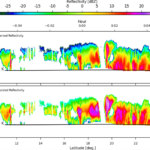In the wake of recent extreme weather events, researchers are finding evidence that climate change may already be affecting our daily lives.
The New York Times reports that a study found that heat waves like the one that struck Texas last year are 20 times more likely to occur now than they were in the 1960s.
Scientists behind the study – such as Philip W. Mote, director of the Climate Change Research Institute at Oregon State University – said that, although these results are tentative, the overall message of the results is that heat waves like this are to be expected of a warming climate.
However, researchers are predicting more impacts than heat waves alone. For instance, Professor Colin Price, Head of the Department of Geophysics, Atmospheric and Planetary Sciences at Tel Aviv University, predicts that increasing temperatures will also lead to an increase in lightning activity.
He said in a American Friends Tel Aviv University article that this could lead to an increase in flash floods, wildfires and damage to infrastructure such as power lines.
That line should strike a nerve with Maryland, Virginia and Washington residents who went without power for days while simultaneously dealing with record-breaking heat after the recent derecho storm on June 29.
However, Harold Brooks, a researcher at NOAA’s National Severe Storms Laboratory, told The Washington Post that there were factors that contributed to the creation of the derecho that may not be directly linked to climate change.
“The hot surface temperatures and high lapse rates aloft directly contributed,” he told the Post. “I’m not sure how much of either of those goes to long-term warming trends.
Offering a counter-argument on whether or not recent events can be treated as indicators of climate change, ESSIC Professor Raghu Murtugudde said on WYPR 88.1 FM on Monday July 9, “That’s kind of a fallacy, we have enough knowledge already … let’s not wait. All of the indicators are there, and we cannot wait 50 years to see [what will happen].”
Is climate change here? Chime in with your answer by responding to a poll asking just that on the ESSIC Facebook page.
Read the entire Times article here.
Read the Tel Aviv University article here.
Read the Washington Post article here.





